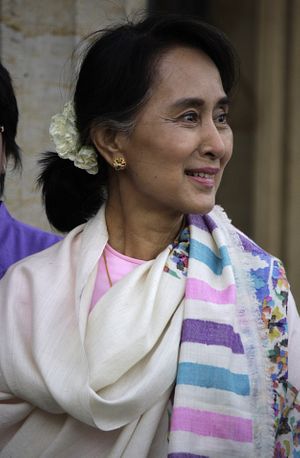Aung San Suu Kyi, Myanmar’s famous opposition politician and democracy advocate, will visit China from June 10-14, at the invitation of the Chinese Communist Party, Xinhua reported last week. It will be Suu Kyi’s first visit to China, representing a break-through in China’s ties with her opposition party, the National League for Democracy. China had a close relationship with Myanmar while it was under military rule – with Suu Kyi under house arrest.
Rumors first emerged that the long-time opposition leader would visit China last November. Citing a senior member of the NLD, Reuters reported that Suu Kyi would visit China in December 2015. At the time, Mu Chunshan, writing for The Diplomat, noted that there are very good reasons for China to invite Suu Kyi to visit: to show China’s openness, to safeguard China’s ties with Myanmar in a changing political environment, and to better “compete” with Western countries making inroads in Myanmar thanks to its political opening. “Deepening contact with Suu Kyi is a necessity for China to preserve its interests in Myanmar,” Mu wrote.
It’s especially important for China to forge ties with Suu Kyi and NLD with the Myanmar general elections coming up by the end of 2015. Though it will face competition from nearly 70 other parties – including the ruling Union Solidarity and Development Party (USDP — the NLD hopes to replicate its strong performance in the 2012 by-election, when it won 43 out of 44 seats it contested. The NLD is expected to win a majority in the parliamentary elections, although Oren Samet pointed out earlier this year that an NLD victory is far from a foregone conclusion. Still, the mere prospect that Suu Kyi’s party (if not Suu Kyi herself, thanks to a controversial section of Myanmar’s constitution) could lead Myanmar gives China a strong impetus to reach out to the opposition leader.
As the staunchest foreign partner of the Myanmar military rulers who kept Suu Kyi under house arrest for over a decade, China starts its outreach at a disadvantage. But any political party looking to lead Myanmar will need to keep a stable relationship with its northern neighbor, something Suu Kyi knows well. That’s especially true now, as ethnic violence in Myanmar close to the Chinese border has ratcheted up tensions between the two countries. The violence has crossed the border on several occasions, including a fatal incident where a Myanmar Air Force plane killed four Chinese citizens in a bombing run on the wrong side of the border.
Asked about Suu Kyi’s upcoming visit in a press conference, Foreign Ministry spokesperson Hong Lei said, “This is an important visit in the party-to-party engagement between China and Myanmar.…We hope that the NLD’s visit will further enhance mutual communication and understanding between the two sides.” Hong confirmed that Suu Kyi will meet with both State and Party leaders. She is expected, in fact, to meet with China’s top two leaders: President Xi Jinping and Premier Li Keqiang.

































